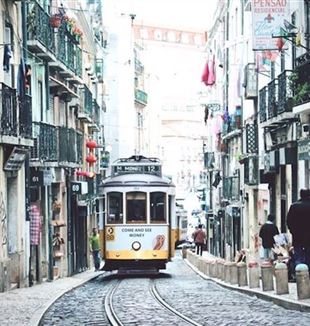
Euthanasia in Portugal: The CL flyer
Following the approval of the "Law on Medically Assisted Death," the local CL community has written a document entitled, "What courage is needed to sustain our hope".The current debate about euthanasia is symptomatic of a loss of desire to live that is far more widespread than we would like to admit or face. A moment like this reminds us how much courage it takes to sustain our hope and that of those who have their eyes upon us. In the face of suffering, questions explode, "Why me? How is it possible to bear this? If this is life, is it still worth living?"
We all have these questions that, in a certain sense, cry out, even if they often seem obscured or anesthetized; it is as if what was evident until recently is no longer so, both in young people, often suffocated by the context in which they live, and in those who, imprisoned in a bed and in a pain for which they see no end or purpose, perceive reality as an obstacle to their desire for happiness. But euthanasia does not solve this drama.
1. A doctor suffering from ALS (amyotrophic lateral sclerosis) in an interview says: "Excuse me, but do you think there is anyone who would want to live like this? In your opinion, when ten years ago I entered the intensive care rooms and I saw people intubated, hooked on tubes and in precarious conditions, what do you think I said and thought? I would never, ever want to live like that. Rather, let me die." He adds, "Yet, the disease has allowed me to realize how good it is to ask for help and, above all, that if we, the sick, are properly cared for, no disease can prevent life from being a right and continues being a gift that is worth living unto the end.”
2. An oncologist also says, "When cancer comes, when pain comes, it is as if life is laid bare. Everything is simplified, the real questions arise. I have found that cancer does not always take one’s life, but it can restore it. Because the living man is the man who asks."
3. A middle school teacher adds, "As a teacher, I see the little ones looking at us and asking us to help them keep alive the hope for which it is worth being born, that it is possible to be happy. They are able to bombard us with existential questions, questions about the meaning of life and death and suffering." For this teacher, the drama she faces every day when she enters the classroom is deciding whether to support her students' infinite heart's desire or to relativize it.
4. At the beginning of this second lockdown, the emergency facility at Lisbon Hospital put out a call for volunteers to support health workers in patient care activities and for administrative support, requiring that they be over 18 and had already been infected with the virus. Eighty volunteers were needed. 845 people registered.
In this pandemic, we have seen traces of hope blossom in so many who have not failed to affirm it, even by sacrificing themselves: in hospital chaplains or in so many young ComVidas volunteers in nursing homes where Covid was spreading (when everyone fled, they entered); in doctors and nurses who work without giving up their response to their patients; in the dedication of so many teachers in continuing the relationship with their students, now at a distance, because this is the mode that reality allows; in the creativity of entrepreneurs and workers who have had to reinvent themselves for their companies not to close.
It is a hope that is echoed in the many who have volunteered to help on the front line, even discreetly and in simple jobs (ten times more than necessary, and in a context of extreme crisis and difficulty), demonstrating that what drives us is the desire to live and not to leave people die.
This same desire drove some to participate in public debate, driven by the need to affirm and testify that the problem posed deserved the search for a real answer, not limited solely to partisan political debate.
The questions that life poses require a credible answer, which can only be given by those who have encountered them, by those who have not erased them, by those who live reason as an opening, allowing themselves to be questioned by life, by those whose reason is not closed and erases them. We need adults who are not afraid of the questions brought up by reason. Especially those questions that explode in the face of suffering: "Why me? How is it possible to bear this? If this is life, is it still worth living?". These questions carry within them a path of good that can be treaded in the company of Christ who has come to accompany us and who, in order to give the only total answer, died like us, experienced the contradiction of a life that seemed lost. And he did so by conquering death, remaining at our side, forever. He answers our questions with His presence, visible today, beside those who suffer.
For this reason, our Bishops insistently remind us that all human life has value and "now more than ever we reinforce our intention to accompany all the sick with care and love in all the phases of their earthly life and, in a special way, in their final phase".
Looking at those who already do so sustains our hope and opens up the possibility of a path that we do not want to miss out on, with all those we meet.
Communion and Liberation Portugal